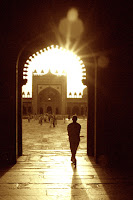“I’m beginning to think that it’s the greatest sin of our time. Knowing and pretending that we don’t know... I knew... Oh, the things I knew... And I did nothing”
Timing is everything and whether by coincidence or design, this production of Judith Thompson’s
Palace of the End arrives at the smaller Studio 2 at the Arcola Theatre, right at the moment when 2 of its 3 strands about Iraq and the conflict there have resurfaced at the top of the headlines with Wikileaks uncovering the shocking scale of prisoner abuse and civilian deaths and the recent publication of the post-mortem report into David Kelly’s death. Thompson’s play pulls together three monologues, fictional in terms of the actual words but thoroughly based in reality as they are all based on real-life people: Lynndie England, the young US soldier whose grinning face whilst abusing Iraqi prisoners became an enduring image of the US intervention; David Kelly, the UN weapons inspector who broke cover to reveal that the position on Weapons of Mass Destruction had been hugely overstated, the pressure of which caused him to take his own life and Nehrjas Al-Saffrah, the wife of an Iraqi Communist politician who lived in Baghdad as Saddam Hussein’s regime took hold.
In the first section, Jade Williams portrays the trailer park girl turned soldier elevated into a position of huge responsibility at the Abu Ghraib prison and patently ill-equipped to deal with it. We see her back in West Virginia, heavily pregnant, awaiting trial and seething with rage at the internet commentary on her, although she’s more offended by being considered ugly than the reaction to her conduct. Williams does well at suggesting the indoctrination of military personnel in order to allow them to devalue human life in such a way but also how suggestible they would have to be to carry out such deeds: it is a complex piece and it is testament to Williams’ performance that s one really does have to begin to question whether or not sympathy might be due to this girl.
Robin Soans (continuing two connections here, he appeared in Swale’s
The Rivals earlier this year and at
Pieces of Vincent here at the Arcola just last month) is incandescent as David Kelly, giving possibly one of the best performances of the year. There’s a searing intensity to his performance as he paces the small space addressing us directly and forcing us to confront his dilemma with him made all the more tragic by his heart-rending simple request that starts his monologue and the quiet dignity in the acknowledgement of his complicity; reminding us of the human tragedy of a family that lost a father and husband: something all those ghoulish conspiracy theorists would do well to remember.
And rounding off the evening is Imogen Smith as Nehrjas whose monologue initially offers a warm portrayal of life in Baghdad back in the 1960s with anecdotes about hundreds of varieties of dates and a genial flightiness. This provides a welcome respite before the emotional sledgehammer which is her account of the suffering inflicted upon her and her family by the Iraqi secret police who came along with the arrival of Saddam Hussein on the political scene. The themes of complicity and responsibility are made explicit here on the larger scale with the reminder that this was a regime initially supported by the USA but also in Smith’s harrowing account of the unimaginable horrors perpetrated upon her and her children as a result of their refusal to divulge information and the terrible guilt that now weighs on her shoulders. Smith does not overplay her hand here, the simply spoken words are enough to pierce the soul without any histrionics and by the time the final twist kicks you in the teeth, the numbed silence as the lights finally come up speaks volumes as to the importance of this work: it almost feels like a crime to applaud, there ought to be some other way to show appreciation (this is mine).
The combined effect is devastating and though only capturing three stories over a stretch of some decades, Thompson shows remarkable subtlety in suggesting how each of her protagonists might have rationalised their actions, she is of course putting words into the mouths of real people who cannot speak for themselves but the connections are sensitively drawn with quiet echoes of motifs and the odd line of dialogue. Swale’s direction shows a strong understanding of how to work in limited spaces, cognisant of the need to keep all three actors engaging in their own ways through movement and unafraid to have them get in the faces of the audience: there were times when I wanted to look away from both Soans and Smith, but I knew that I could not. Simon Kenny’s design is simple and maintains the Arcola’s green credentials by recycling one of the tree trunks from
The County. Altogether, a stunningly affecting evening that is rarely easy but vitally important and intensely compelling.
Running time: 1 hour 40 minutes (without interval)
Programme cost: free on some of the seats as you go in, but limited supplies so be quick (I didn’t get one!)
Booking until 20th November
